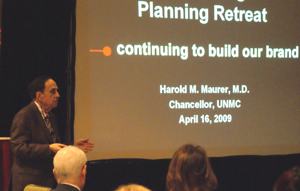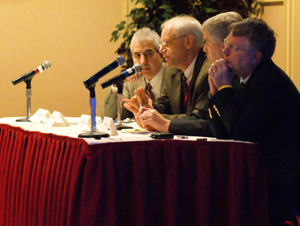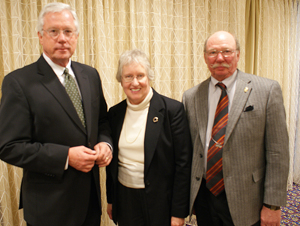 |
UNMC Chancellor Harold M. Maurer, M.D., gives opening remarks at Thursday’s Strategic Planning Retreat. |
 |
Steve Hinrichs, M.D., second from left, makes a point during a panel discussion on personalized medicine as Hamid Band, M.D., Ph.D., left, James Shull, Ph.D., second from right, and Gordon Mills, M.D., Ph.D., look on. |
 |
Michigan State University’s William Anderson, Ph.D., left, with UNMC’s Myrna Newland, M.D., and James Turpen, Ph.D., at Thursday’s retreat. Dr. Anderson presented a discussion about an academy for academic scholars during the retreat. (Photos by Andrew Nelson, UNMC public relations) |
To illustrate his point, Dr. Mills, Ransom Horne Professor in Cancer Research and chairman in the department of molecular therapeutics at the University of Texas, M. D. Anderson Cancer Center, took a survey of Thursday’s crowd at the Chancellor’s Strategic Planning Retreat.
He asked how many in attendance were able to drink coffee after 10 a.m. and still sleep at night. A little more than half of the crowd raised their hands.
“The rest of you are ‘slow acetelators,'” Dr. Mills said, meaning that they are physically unable to process the caffeine in the coffee fast enough to sleep well.
The same principle applies to all other medicines, Dr. Mills said.
Technology and expertise is now available that allows scientists to identify what medicines will affect which people and how. This is known as personalized medicine and it stands to drastically improve care, reduce costs and save lives, said Dr. Mills, who also is co-director of M. D. Anderson’s Robert J. Kleberg, Jr. and Helen C. Kleberg Center for Molecular Markers.
He was in Omaha on Thursday as part of a retreat panel discussion on personalized medicine.
Traditional medicine and dosages have been set using a “one-size fits all” mentality that has resulted in perfectly good drugs being removed from the market because a small portion of the population reacted adversely to them.
Conversely, Dr. Mills said, other drugs are prescribed at ineffective levels for many people.
And beyond drugs, diseases are more diverse than previously thought and they also react individually to treatment.
Personalized medicine could allow health care professionals to tailor treatment to individuals based on biomarkers such as genetics and other factors, Dr. Mills said, and he believes it’s the responsibility of health care professionals to make this happen.
As an example, Dr. Mills noted that scientists have used biomarkers to determine that a certain type of breast cancer can be treated without the use of chemotherapy.
“Scientists have been able to show that not only do the patients with this certain type of cancer not need chemotherapy, it actually will be ineffective,” Dr. Mills said.
This finding that used personal medicine principles have saved many women the expense and extreme discomfort associated with chemotherapy, he said.
As UNMC considers a move into the world of personalized medicine, Dr. Mills said the medical center would be wise to find solid leadership and to play to its strengths. He mentioned UNMC’s outstanding programs in pancreatic cancer and lymphoma as possible entry points for personalized medicine investigations.
Another possible move on UNMC’s radar is the formation of an academy of teaching scholars — which would serve as a body that would reward and support faculty members who view themselves primarily as teachers.
The academy would help such faculty members conduct and publish education-related research, which would help these faculty receive promotions and achieve tenure.
|
UNMC has outstanding educational facilities, a solid history of supporting quality educational leaders and already-existing programs that reward academic scholarship, said Dr. Anderson, a graduate of Omaha Benson High School who directs an academic scholars program at Michigan State that has about 400 graduates.
Dr. Anderson has previously served as a consultant to UNMC on some educational endeavors.
Challenges UNMC would face in developing such a program include:
- Fostering departmental cultures that place value on academic scholarship;
- Building a critical mass of educators interested in academic scholarship; and
- Installing sustained and committed leadership of such an academy.
A small pool of funding for academic scholarship is another challenge such an academy would face, Dr. Anderson said.
But the formation of such an academy would be a strong demonstration of UNMC’s commitment to quality education, said Dr. Anderson, who also noted that institutions that emphasize teaching by forming such academies often have a high-rate of student satisfaction.
UNMC Chancellor Harold M. Maurer, M.D., said retreat discussions of personalized medicine and academic scholarship, as well as talks about other vital campus issues, were based on exciting ideas that could lead to significant steps in the medical center’s march toward world-class status.
“What we have discussed are big, inspiring ideas,” Dr. Maurer said. “Big ideas energize, and generally, big ideas are successful.”